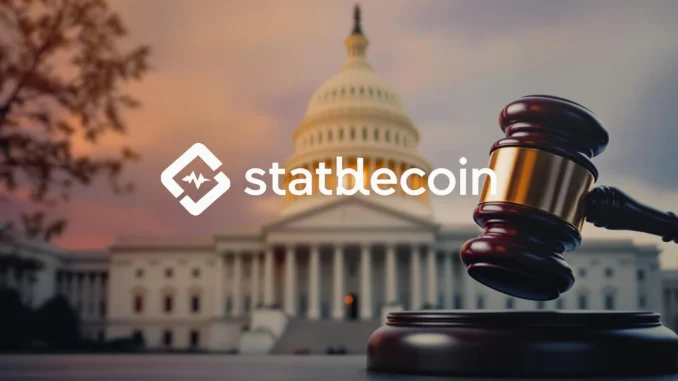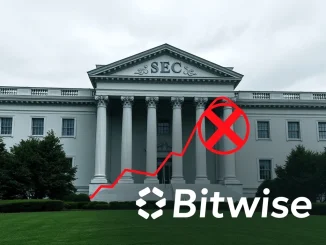
Exciting developments are unfolding in the world of cryptocurrency regulation! Investors and crypto enthusiasts, keep your eyes peeled on Capitol Hill. The buzz is that the Senate Banking Committee is gearing up for a significant move on stablecoin legislation. Are we finally seeing progress on a clear regulatory path for stablecoins in the US? Let’s dive into what this could mean for the future of digital assets.
Senate Banking Committee Schedules Potential Markup for GENIUS Act
According to a report from Fox Business’s Eleanor Terrett, citing three Senate aides, the week of March 10 is being eyed by the Senate Banking Committee for a markup of the GENIUS Act. This bill, championed by Senator Bill Hagerty, focuses specifically on stablecoin regulation. A markup is a crucial step in the legislative process, where committee members debate, amend, and potentially vote to send a bill to the full Senate for consideration. This news signals a potential acceleration in the journey of the GENIUS Act towards becoming law.
Here’s a quick breakdown of what’s happening:
- The Bill: GENIUS Act – Senator Bill Hagerty’s stablecoin bill.
- The Committee: Senate Banking Committee.
- The Timeline: Week of March 10 is being considered for markup.
- The Source: Eleanor Terrett of Fox Business, citing three Senate aides.
Why is the GENIUS Act and Stablecoin Regulation Important?
Stablecoins are a type of cryptocurrency designed to maintain a stable value, often pegged to a fiat currency like the US dollar. They play a vital role in the crypto ecosystem, facilitating trading, lending, and various decentralized finance (DeFi) applications. However, their rapid growth and systemic importance have caught the attention of regulators worldwide. Stablecoin regulation is crucial for several reasons:
- Investor Protection: Clear rules can protect consumers from potential risks associated with stablecoins, such as lack of transparency or insufficient reserves backing their value.
- Financial Stability: Given their increasing interconnectedness with traditional financial markets, regulators want to ensure stablecoins do not pose a threat to broader financial stability.
- Clarity for Innovation: Well-defined regulations can provide much-needed clarity for businesses operating in the stablecoin space, fostering innovation and responsible growth within the industry.
- Combating Illicit Activities: Regulations can help address concerns about the use of stablecoins for money laundering and other illicit activities.
What is the GENIUS Act Aiming to Achieve for Cryptocurrency Bill Landscape?
While specific details of the GENIUS Act are subject to ongoing discussion and potential amendments during the markup process, it is understood to be a significant cryptocurrency bill aimed at establishing a federal framework for stablecoins. It’s anticipated to address key aspects such as:
- Issuer Requirements: Defining who can issue stablecoins and what capital reserve requirements they must meet.
- Regulatory Oversight: Determining which regulatory bodies will oversee stablecoin issuers and their activities.
- Payment System Integration: Potentially clarifying how stablecoins can be integrated into existing payment systems.
- Interoperability: Addressing how different stablecoins might interact and ensure seamless transactions.
The GENIUS Act is not the only cryptocurrency bill in the pipeline, but it is a prominent one focused on a critical segment of the digital asset market. Its progress is being closely watched by the crypto industry and regulators alike.
Why March 10 Could Be a Pivotal Date?
The week of March 10, if indeed confirmed for the markup, represents a potentially pivotal moment for stablecoin regulation in the US. A successful markup would signal that the Senate Banking Committee is serious about advancing this legislation. It would be a significant step forward in moving the GENIUS Act closer to a vote in the full Senate and, eventually, becoming law.
However, it’s important to remember that a markup is just one step in a lengthy legislative process. The bill could still face significant hurdles, including:
- Committee Amendments: The markup process itself could result in substantial changes to the bill.
- Senate Floor Debate and Vote: Even if passed by the committee, the bill needs to be debated and voted on by the entire Senate, where it could face further amendments or opposition.
- House of Representatives: The bill would also need to pass the House of Representatives, which may have its own versions of stablecoin legislation under consideration.
- Presidential Signature: Finally, even if passed by both chambers of Congress, the bill needs to be signed into law by the President.
What are the Potential Implications of the GENIUS Act and Stablecoin Regulation?
The implications of the GENIUS Act and broader stablecoin regulation are far-reaching and could reshape the cryptocurrency landscape. Depending on the final form of the legislation, we could see:
- Increased Legitimacy and Adoption: Clear regulations could bring more legitimacy to stablecoins, encouraging wider adoption by both institutions and retail users.
- Market Consolidation: Stricter requirements for stablecoin issuers could lead to consolidation in the market, with fewer, more compliant players dominating.
- Innovation Hubs: The regulatory environment shaped by the GENIUS Act could influence where crypto innovation thrives, potentially making the US a more attractive hub or, conversely, pushing innovation elsewhere if regulations are perceived as too restrictive.
- Impact on DeFi: Regulations could significantly impact the DeFi sector, which heavily relies on stablecoins. The rules could either enable more robust DeFi growth or stifle certain aspects depending on their design.
Stay Tuned for Updates on the GENIUS Act and Senate Banking Committee
The coming weeks are crucial for the GENIUS Act and the future of stablecoin regulation in the United States. Keep following cryptocurrency news outlets for the latest updates on the Senate Banking Committee’s activities and the progress of this important legislation. The potential markup in the week of March 10 is a significant development to watch closely. This could be a defining moment for the regulatory framework governing digital assets and pave the way for a more structured and secure crypto ecosystem. Stay informed, stay engaged, and prepare for potential shifts in the crypto landscape as these developments unfold!



